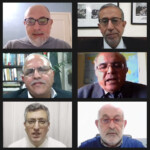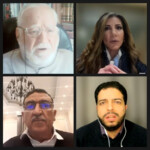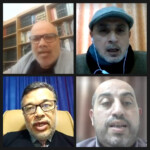A panel discussion, held by al-Zaytouna Centre, made a strategic evaluation of Arab, Islamic and international developments and positions in 2022 and provided a future outlook for these positions in 2023. The panel discussion was held on 11/1/2023, with the participation of dozens of experts and specialists in Palestinian affairs.
The panel discussion included five papers, where the first was by Ashraf Bader, discussing the Arab scene and its prospects; the second was by Prof. Dr. Walid ‘Abd al-Hay on the international scene; the third by Hani Mohammad ‘Adnan al-Masri on the peace process and its prospects; the fourth was by Prof. Dr. Talal ‘Atrissi on the Iranian position towards the Palestine issue and its prospects; and the fifth was Dr. Sa‘id al-Haj on Turkey’s position towards the Palestine issue and its prospects. A selection of researchers, scholars and specialists discussed the papers with important interventions and questions, and the session was concluded by the answers and clarifications of the main panelists.
The Arab World
Arab wise, the panel discussion noted that there is a widespread opposition to normalization with Israel, where 85% consider Israel the greatest threat to the Arab world. This was seen clearly during the World Cup in Qatar. Algeria took the lead, Arab and African wise, in resisting normalization, and it will continue to do so in 2023. Oman has expanded its Israel boycott law, while Kuwait will continue to have strong official and public opposition to normalization, and so will Syria, Libya, Lebanon, Tunisia and Yemen. As for the faltering normalization process with Sudan, it will witness more confusion, due to the instability of Sudan’s government, and the fact that the anti-normalization forces are regaining momentum. Qatar will continue supporting the Palestine issue, maintaining its relationship with the Palestinian forces, hosting Hamas leaders and supporting the Gaza Strip (GS), while having calculated steps of normalization with Israel. These dynamics enable Qatar to practice proxy diplomacy, while relieving external pressures, especially with its keenness to ensure the success of major events it hosts, such as the FIFA World Cup and others.
As for Saudi Arabia, it will continue its gradual normalization, preferring having relations under the table, and as long as it does not face real pressures or critical circumstances, it is not in a hurry to go public. It also has its own complex calculations to ensure it maintains its leadership in the Muslim world, and that it would not clash with the broad public opinion that rejects normalization. However, the Saudi-Iranian tension may increase, causing some regional tension that would impact the global oil and gas markets.
No change is expected in the Jordanian and Egyptian positions. However, the Jordan-Israel relations may witness some tension in 2023, due to having an extremist Israeli government that wants to dominate over al-Aqsa Mosque and Jerusalem and marginalize the Hashemite Custodianship of the holy sites, promote the notion of an alternative homeland for Palestinians, and end the peace process.
It seems that the UAE will actively pursue normalization with Israel, for their trade relations have exceeded $2 billion in 2022, and it seems that the formation of an extremist religious right government did not have much impact on the UAE-Israel relations. As for Bahrain and Morocco, they are following the UAE’s lead in normalizing ties with Israel, albeit to a lesser degree, for there is a strong, broad and organized opposition to normalization in both countries. The three countries are continuing to conclude normalization agreements in the economic, political, educational, security, military, health and tourism fields. The UAE is even announced that the Holocaust will be taught in school curricula.
As for the Negev Forum that brings together Israel and other normalizing countries, it is expected to continue to convene, even if it faces some difficulties, where Jordan is dissatisfied with the Israeli government conduct.
It is unlikely that a war will occur between Israel and Hizbullah in Lebanon, for these parties are not interested in such an escalation, especially after a gas deal was reached between them.
Israel will continue to dominate Syrian airspace, implementing the Mowing the Grass strategy and targeting any site that it deems as a threat or that it is crossing its “red lines.”
The International Scene
Internationally, the panel discussion expected that the US international status will continue to decline, and so will its position in the Middle East, however, this does not mean that the US will lose its position as a superpower and a major player in the Middle East. It is expected that the Ukraine war would escalate in March and April 2023. The Russians will escalate their attacks to achieve some gains and impose some terms, putting the US in a weaker position. The outcome of this war would serve the Arab interests.
It also expected that China would step up pressure on Taiwan to achieve tactical gains, which will also place more burdens on the US and weaken its position. In this case, Israel will try to balance between maintaining its strong relations with China and keeping its vital strategic relations with the US.
Netanyahu will try to mitigate US fears of the collapse of the peace process and his inability to promote his new government internationally, by escalating tensions with Iran, or even launching a war on GS.
At a time when global economic growth declined to about 2.7%, and global poverty rates have increased; the global support for the Palestinian Authority (PA) is expected to continue to decline.
In South America, it appears that there is a resurgence of the center-left movement, after it won the Elections in Chile and Brazil. This means the Palestine issue will have more support there. However, the rise of Anglicanism at the expense of Catholicism provides a better religious and cultural base for Israeli penetration in the region.
The Peace Process
The panel discussion confirmed that the peace process has no prospects in the foreseeable future, and that the Israeli side is neither serious about it, nor committed to the “two-state solution.” Israel has rather sought to benefit from this process, as a cover to legitimize itself regionally and internationally, and impose facts on the ground, especially the Judaization of the land and holy sites. Moreover, the Israeli society tends to become more religious and right-wing extremist, refusing to hold meetings with President ‘Abbas. In is noted here that the US administration will not contradict the Israeli wishes regarding the peace process, the Middle East Quartet has “died,” the EU does not have the political will to push for the peace process, China will continue to present its usual official positions without revitalizing its political role, and the Russians are not in a position to put pressure on Israel.
Nevertheless, the PA, the normalizing Arab countries and the US and its allies will seek to preserve the “illusion” of a settlement, for they have no other choice. Otherwise, they will declare failure, and thus open the way for the resistance forces to fill the void.
The extremist Israeli government will seek to accelerate the process of Judaization and building settlements in Jerusalem and the rest of the West Bank (WB), which will be the next “battlefield.” The dominant forces in the Knesset will provide the cover to legitimize the annexation of Area C. However, it will leave Netanyahu to choose the appropriate time for implementation. These forces also plan to displace large numbers of Palestinians, when the circumstances are suitable. This means that the ruling religious and right-wing parties will seek to resolve the conflict on the ground, however, this escalation will be relative and deliberate, so that it reaches the maximum possible extent without paying prices that the occupation cannot afford.
Therefore, the peace process will likely remain frozen, as long as Israel insists on imposing its vision, the Palestinian leadership is impotent, the Arab and Muslim states are weak, divided and some have normalizing ties with Israel, and as long as the international community supports the occupation or does not prevent it from continuing its aggression on land and people.
Iran and Turkey
The panel noted that Iran is under severe pressure, for the Iranian nuclear talks have failed, and Iran was unable to recover tens of billions of dollars of its assets in foreign banks and be economically open to the rest of the world. Furthermore, Iran is going through widespread popular protests, which the US and its allies are trying to support. It was exposed to US and Israeli threats because of its policy in the region, and it has angered the US and EU, because it provided Russia with UAVs in its war with Ukraine.
Iran is expected to keep the same policies and positions towards the Palestine issue; whether by refusing to recognize Israel, or by continuing to support the resistance action, financially and militarily. It has supported the reconciliation between Hamas and the government in Syria, and will seek to strengthen the relations between its allies, and achieve more coordination between the resistance forces inside Palestine and abroad.
As for Turkey, for various reasons, there was a clear shift in the Turkish policy, and the relations with Israel were improved. These reasons include the upcoming Turkish elections; regional developments; the end of the Arab Spring; Turkey’s need to improve its relations with Egypt and Israel to face the Greek ambitions and challenges; and the fact that the Biden administration is encouraging regional countries to solve their own problems.
Even with Netanyahu’s extremist government, the Israel-Turkey relations are expected to improve, as long as there is no direct serious damage done to al-Aqsa Mosque. It seems that the decision to strengthen the relationship was taken at the highest Turkish levels, and will likely to continue even after the end of the Turkish elections.
***
The panel discussion called for understanding the Arab and international changes, and the encouragement of futures studies, in order to benefit the Palestine issue and its future prospects.
Participants called for reviving and strengthening the Palestinian national project, while having an effective national partnership that would face the serious challenges of the Palestine issue. They called for strengthening resistance in all its forms, developing popular resistance in Jerusalem and the rest of WB, while diversifying its patterns and levels to achieve the greatest benefit and the highest possible pressure on the occupation, in order to thwart its plans.
Al-Zaytouna Centre for Studies and Consultations, 12/1/2023







Leave A Comment